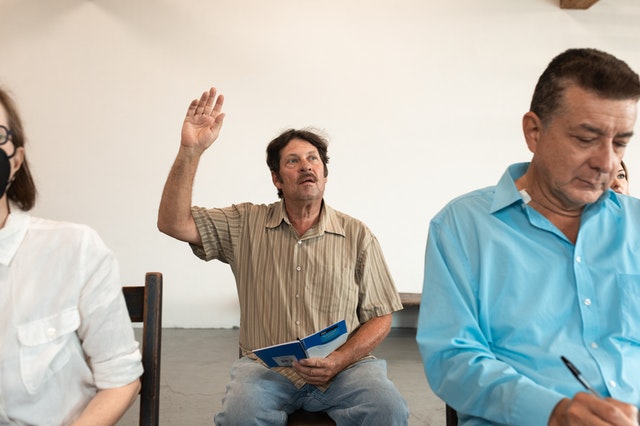Duolingo Writing Tasks
Join my Duolingo telegram channel
There are several written tasks in the Duolingo Englsh test, although all of these are shorter than the writing tasks in IELTS or TOEFL.
You will be given three pictures to write about and two written prompts. Finally, you will be given a writing prompt as part of the ungraded interview which is sent to the institutions which you have elected to receive your results.
For the pictures, you will be given 60 seconds to write about the picture. This time should allow you to type 2-3 sentences.
For written prompts you have 5 minutes. Although you only need to write 50 words, you should aim to write closer to 100 words. The more you right, the more of your grammar and vocabulary knowledge you can show.
Examples
Write about a picture
Write one or more sentences that describe the picture.

Your answer:
A man is working on his laptop and drinking a hot drink. It looks like he is in a coffee shop at night as the lights of the town are reflected in the glass.
Write in response to a prompt
Respond to the statement in at least 50 words.
Many parents will take away a child’s phone for bad behaviour.
Do you agree or disagree with this practice?
Your answer:
On the one hand, I agree that taking away a child’s phone for bad behaviour is likely to make a child think about what they have done wrong and recognise that there are consequences for their actions. On the other hand, it has become normal for parents to keep in touch with their children by mobile phone. Parents could therefore be shooting themselves in the foot, because they would then find it more difficult to get in touch with their children and vice versa. For example, if a child knows they will be late home, most parents would probably appreciate a text from their child explaining this. Without a mobile phone, the child may not be able to do this, which could cause the parent unnecessary anxiety.
Writing for the ungraded interview
Choose a topic to write about:
TOPIC 1 – Describe the geography of the country where you currently live. How does the geography of the country affect the people who live there.
TOPIC 2 – Describe a story you enjoy. What do you like about the story? How could it be better?
Write for 3 to 5 minutes about the topic below:
Describe a story you enjoy. What do you like about the story? How could it be better?
One of my favourite stories is the satirical novel Catch-22 by Joseph Heller. It is set in Italy during World War II, and centres around a number of American air force recruits. In particular, the protagonist, Yossarian, is a kind of anti-hero as he just wants to get away from the war and return home.
One of the things I like most about this story is that it examines the absurdity of war and military life. At several moments there are exchanges between officers which really emphasise this ridiculousness.
In my opinion, the novel is perfect and I wouldn’t change anything. Something that I would really like to see though is a movie adaptation. I am aware that there was one in the 1970s and that it has even been turned into a series. However, I would really like to see a modern feature film with the big-budget Hollywood treatment.
Strategy
According to duolingo, the writing tasks are designed to test a number of features including:
- Grammatical accuracy
- Grammatical complexity
- Lexical sophistication
- Lexical diversity
- Task relevance
Essentially, therefore to score high you need to use complex sentences, using a range of grammatical forms accurately. You should use less common words and be careful to try to avoid repeating the same words. Finally, you need to stay on topic.
Step 1 - Take a few seconds to think
Don’t just put the first thing that comes to your head. You do need to get writing fairly quickly, but do take a few seconds to think about what you want to write.
For the pictures, you can use about 10 seconds for this. Think about what you can say is happening in the picture.
For the written prompts and ungraded interview, you have a bit more time. You could use 30 seconds here to think about what you want to say.
Step 2 - Try not to edit as you go
Once you have a good idea about what you want to write, type and try not to edit as you go. Get your ideas down first and then if you have time left, you can go back and edit. You may find it helps to practise free-writing before the exam.
Step 3 - Grammar
As discussed above, to score highly you need to use a range of grammar accurately and make use of complex structures. It is generally better exam practice to focus on producing complex sentences than trying to use the least common tenses.
A complex sentence is one that contains two or more clauses, where one clause can stand alone as a sentence and the others depend on it. For example:
(A) I went to the shop. I bought some milk.
(B) I went to the shop and I bought some milk.
(C) I went to the shop in order to buy some milk.
(D) I went to the shop in order to buy some milk and I saw a famous actor.
A is two simple sentences. These are not grammatically complex and are therefore likely to receive a lower score. B is a compound sentence since it contains two clauses which do not depend on each other. C is a complex sentence, as “I went to the shop” is the main clause and “in order to buy some milk” is the dependent clause. Finally, D is a compound-complex sentence since it has two main clauses and one dependent clause.
After practising, analyse the sentences you are writing. How many are simple, compound, complex or even compound-complex?
It is not necessarily wrong to use simple sentences. They can be quite effective in making a point. However, they should be part of a mix that includes other types of sentence too.
Step 4 - Lexis
As well as grammar, you are being assessed based on your lexis or vocabulary.
You need to try to use some less common vocabulary in your answers if you want to score highly. However, it is important that you use this vocabulary correctly and without straining to use it.
An extreme example would be if you were describing the picture above, and you said the man is not jumping on a bouncy castle. It’s true that he isn’t and bouncy castle is definitely a less common word, but it is an odd point to make. If you do this, you run the risk of using the words poorly.
Using correct collocations is also important. If we say he is sitting in a cafe, this collocates well. If we say that he is staying in a cafe, this does not collocate very well.
Practice
Use the pictures and prompts below to practice your writing.
Pictures












Prompts
Some parents will take away a child’s phone as a punishment for bad behaviour. Do you agree or disagree with this practise?
Parents are entitled to read their childrens’ text messages. Do you agree or disagree?
Describe the technology currently used in schools. What is the most important technology used in schools? Why?
Many people now get their news from the internet. What impact has this had on society?
What has been the most important invention in the last 20 years? How has it affected people’s lives?
Describe your favourite teacher. What qualities did you respect most?
In some schools, students are separated by gender. Why do you think this is and is it effective?
In some countries, students are streamed according to ability. What are the advantages and disadvantages of such an approach?
Teachers have to provide students with a balance of encouragement and constructive criticism on their work. Why is it important for teachers to find the right balance?
Many schools and universities attempt to use different ways to assess students (tests, essays, project work). Why do you think this is?
Your local government have received some money to improve your local area. How should they use the money to benefit local residents?
Describe your local area. How has it changed in the last 10 years?
If you could live anywhere in the world, where would you like to live and why?
Overpopulation in major cities contributes to homelessness. How can governments ensure there is enough housing for everyone?
Some cities have famous sports teams. Does this provide any benefits or drawbacks for the residents?
In many parts of the world, sports are a necessary part of the school curriculum. Is this a good use of children’s time at school?




